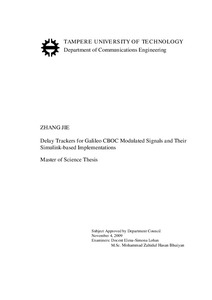Delay Trackers for Galileo CBOC Modulated Signals and Their Simulink-based Implementations
Zhang, Jie (2010)
Zhang, Jie
2010
Tieto- ja sähkötekniikan tiedekunta
This publication is copyrighted. You may download, display and print it for Your own personal use. Commercial use is prohibited.
Hyväksymispäivämäärä
2010-02-03
Julkaisun pysyvä osoite on
https://urn.fi/URN:NBN:fi:tty-201008241305
https://urn.fi/URN:NBN:fi:tty-201008241305
Tiivistelmä
Galileo will be the future European Global Navigation Satellite Systems (GNSSs), which is going to provide high availability, increased accuracy and various location services. This new satellite system proposes the use of a new modulation, namely the Composite Binary Offset Carrier (CBOC) modulation, which motivates the research on GNSS receiver with this new modulation.
Code tracking is one of the main functions in a GNSS receiver and its task is to give an accurate estimation of the code delay. The accuracy of this code delay estimation is strictly connected with the accuracy of user position computation. One typical code tracking structure is the code tracking loop. The code tracking algorithms or delay trackers used in code tracking loop are the main aspect, which affects the performance of code tracking loop. Various typical delay trackers are studied in this thesis.
Simulation is one important issue in the design and analysis of any communication system or navigation system. One method for testing delay trackers and effects from different tracking algorithms can be realized in the simulation tool, such as a software receiver. The simulation tool makes it convenient to test various algorithms used in the receiver and to investigate the receiver performance before the algorithms are built in the real devices. On the other hand, the implementation of delay trackers in a software receiver can be also helpful for further developing the simulation tool.
The goal of this thesis has been to develop and analyze the implementations of various code delay trackers for Galileo systems via Simulink tool. The analysis has also helped to further develop the model in order to include realistic receiver constraints for mass-market application. The performance of the delay trackers is measured in terms of Root Mean Square Error (RMSE), tracking error variance and Multipath Error Envelopes (MEEs). /Kir10
Code tracking is one of the main functions in a GNSS receiver and its task is to give an accurate estimation of the code delay. The accuracy of this code delay estimation is strictly connected with the accuracy of user position computation. One typical code tracking structure is the code tracking loop. The code tracking algorithms or delay trackers used in code tracking loop are the main aspect, which affects the performance of code tracking loop. Various typical delay trackers are studied in this thesis.
Simulation is one important issue in the design and analysis of any communication system or navigation system. One method for testing delay trackers and effects from different tracking algorithms can be realized in the simulation tool, such as a software receiver. The simulation tool makes it convenient to test various algorithms used in the receiver and to investigate the receiver performance before the algorithms are built in the real devices. On the other hand, the implementation of delay trackers in a software receiver can be also helpful for further developing the simulation tool.
The goal of this thesis has been to develop and analyze the implementations of various code delay trackers for Galileo systems via Simulink tool. The analysis has also helped to further develop the model in order to include realistic receiver constraints for mass-market application. The performance of the delay trackers is measured in terms of Root Mean Square Error (RMSE), tracking error variance and Multipath Error Envelopes (MEEs). /Kir10
